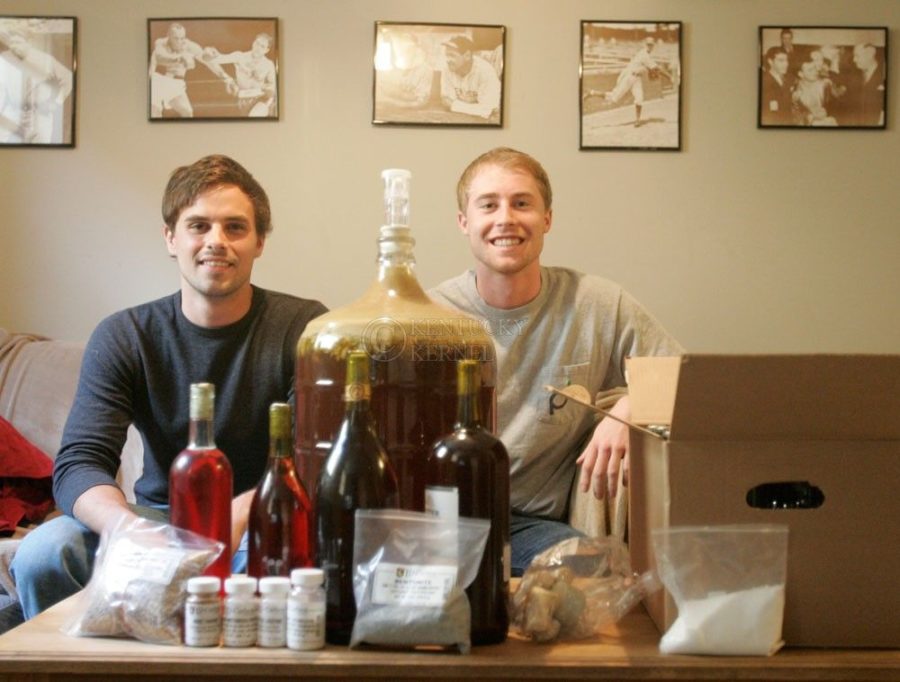Alcohol is brewing: two students concoct own beer, wine
March 28, 2012
For most college students, the only thing they have brewing is trouble, but for two UK students the only thing brewing is alcohol.
Adam Green, a marketing senior, first heard about home brewing while working at a restaurant in his hometown. The restaurant sold local home brewers’ special beer recipes.
His interest in concocting his own brew grew and ultimately led him to start brewing about a year ago after receiving a kit as a gift.
“I figured, hey, I like beer and it would probably be cheaper and kind of cool to make it on my own,” Green said.
Green brews beer while his roommate, Christopher Martorana, a communication and Spanish senior, brews wine.
For beginner home brewers of beer there are two processes: extract brewing and all-grain brewing.
Green decided to use the extract brewing process, saying that it is easier for beginners and less time consuming.
All one has to do is heat 3 gallons of water to 150 degrees and steep specialty grains for about 30 minutes. Then get the water to a rolling boil and put in the extract, which is fermentable sugars that the yeast eat, he said.
This creates alcohol and carbon dioxide, he said.
“Once this is done, you can add the hops and other ingredients depending on the type of beer you’re making,” Green said.
It needs to cool to 70 degrees and be put it into the primary fermenter, then have 2 gallons of water and the yeast added, letting it sit until it’s matured, he said.
“The biggest thing is to pay close attention to sanitation throughout all of these steps,” Green said.
The grain brewing process, Green said, is much more involved and incredibly more creative.
In this process, however, the home-brewer must boil 6 gallons of water at once usually by using a propane heater, which can bear limitations to the average college student.
“Overall, for both processes though, the ingredients manifest into different flavors depending on how long you boil them and in what combination,” Green said.
Concerning the length of the process, for Green it takes around three hours to “cook” the brew.
After that, it spends a week in the primary fermenter and is then transferred to the secondary fermenter, which adds extra clarity to the beer and dries the hops for aroma, for another week.
Finally, the beer is bottled, which takes about an hour for 56 12-ounce bottles, and allowed to naturally carbonate for two weeks.
Martorana decided to start brewing as well after seeing Green’s success, but chose wine instead of beer.
“I saw how much money (Green) was saving by making his own booze,” Martorana said. “I chose wine because I didn’t want to copy him. Plus, it makes me seem more sophisticated.”
As for making batches of wine, Martorana said “the brewing process is similar in that it takes time, patience, the appropriate ingredients and most importantly, clean and sanitized equipment.”
He said though it doesn’t have quite as many steps as brewing beer, it takes about three to four months to make a batch of wine.
While Green and Martorana brew different types of alcohol, both use the same basic equipment that can easily be found online.
The Brewing Basics Equipment Kit came from midwestsupplies.com and supplies the various fermenters, buckets, cleansers, meters for measuring alcohol content and temperature, and bottling tools required to make batches of beer or wine.
For those interested in brewing their own beer or wine, Green and Martorana suggest visiting homebrewtalk.com to learn more about the processes.
Martorana said it’s an easy process.
“The process of making it is the best part,” Martorana said. He said people can make some alcohol, just as long as they don’t sell it without a license.
Green said that really anyone can brew his or her own beer and that “it’s easy and rewarding — especially to be able to share my creations with my family and friends.”
“I would just recommend that people who try it don’t give up if you think you messed up. I thought I really screwed up a batch but it ended up being my best one yet,” Green said. “No matter what, you will always end up with beer.”
































































































































































